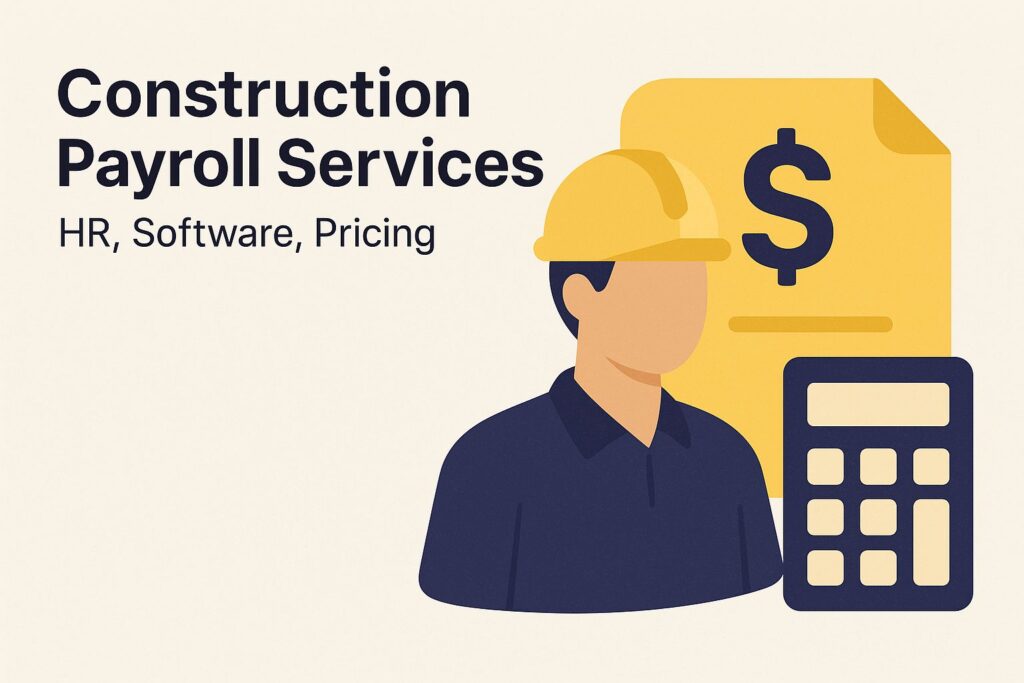
Construction Payroll Services | HR, Software, Pricing
Managing payroll in the construction industry isn’t just a numbers game-it’s a critical part of your project’s success. Handling payroll accurately is essential for success when managing complex labor laws and limited budgets. This guide covers the basics of construction payroll services, including compliance, HR duties, recommended software, and pricing options. Learn how to make your payroll process simpler and work faster.
Importance of Payroll in Construction
Managing payroll well in construction is key for following labor compliance and keeping project finances healthy. Worth exploring: Payroll Outsourcing Cost in Aurora, CO offers insights into managing payroll efficiently.
Compliance with Labor Laws
Knowing labor laws is important for construction payroll. Ignoring the rules can lead to large fines, with each mistake costing about $5,000.
Key labor laws affecting construction payroll include the Fair Labor Standards Act (FLSA), which establishes minimum wage and overtime requirements, and the Occupational Safety and Health Administration (OSHA) standards, ensuring workplace safety.
To stay compliant, use tools such as Zenefits for HR tasks, which gives notices about changes in labor laws. Review these laws every six months to stay compliant, and train your payroll team to keep them informed about any changes.
These proactive steps can mitigate risks and create a compliant work environment.
Impact on Project Budgeting
Mistakes in payroll can increase project expenses by as much as 30%. This highlights the importance of precise payroll handling and cost evaluation for successful budgeting in construction projects.
For instance, a construction firm underestimated labor costs in a recent project due to payroll mismanagement, leading to a $100,000 budget overrun.
To avoid these problems, use tools like QuickBooks, which makes payroll tracking easy and connects with your accounting processes. Creating regular reports on labor expenses can help manage finances effectively. If interested, you might explore the cost benefits of payroll outsourcing as an additional solution.
Regularly auditing timesheets and payroll entries can also prevent discrepancies, ensuring resources are allocated correctly and that profitability remains intact.
HR Functions in Construction Payroll
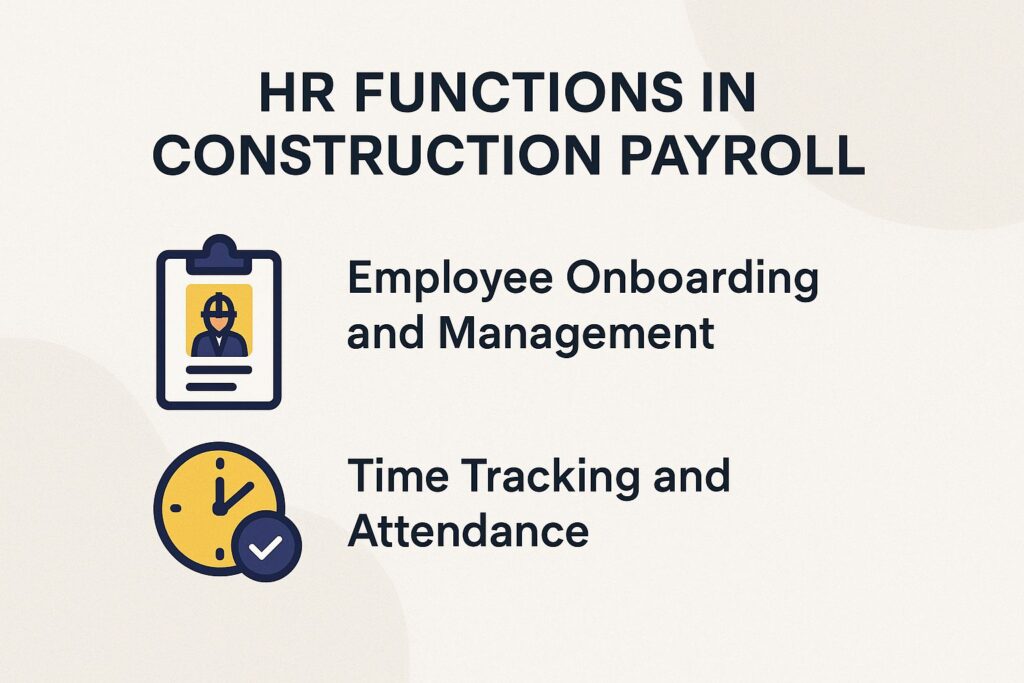
HR roles are key to construction payroll. They manage tasks such as hiring new employees, accurately tracking time, and ensuring payments, including contractor payments, are made correctly and on time. For businesses considering ways to streamline these processes, understanding the cost of payroll outsourcing in Gilbert, AZ can provide valuable insights into potential cost savings.
Employee Onboarding and Management
A clear and efficient onboarding process helps reduce employee turnover by 25%, ensuring new hires adjust quickly and get their correct salary and benefits.
To make your onboarding process in construction smoother, use BambooHR to organize all HR activities, making it simpler to handle documents and monitor employee progress.
Also, give new employees training on payroll software such as QuickBooks to reduce mistakes, helping them use payment systems with assurance.
Create a structured orientation program that includes safety protocols and job-specific training. This method speeds up their integration and supports a safe and efficient work environment, which is very important in construction.
Time Tracking and Attendance
Time tracking systems like TSheets can reduce payroll errors by up to 40%, leading to better payroll calculations and management.
Using TSheets, employers can easily monitor employee work hours via GPS-tracking and timesheet submissions, ensuring that pay reflects actual hours worked, including hourly wages and overtime calculations.
Similarly, ClockShark offers mobile punch-in capabilities, perfect for construction workers on job sites. Both tools automatically calculate overtime, simplifying payroll processing.
- To make it work well, teach employees how to record hours correctly.
- Often check reports to find any mistakes.
A good tracking system makes payroll easier and helps understand labor efficiency and project expenses.
Payroll Software Solutions
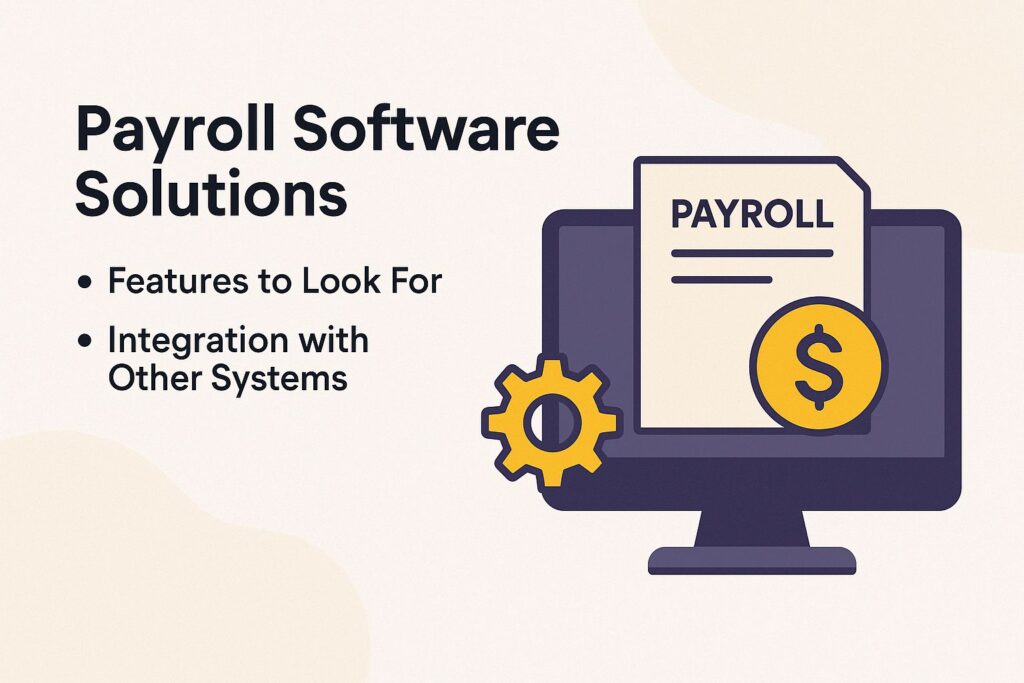
Picking the right payroll software can save construction companies up to 30 hours of paperwork each month and help them follow legal and compliance rules properly. For a thorough exploration of available options, our guide to the best payroll software in 2024 offers valuable insights.
Features to Look For
Key factors to look for in payroll software include automatic tax calculations, features for making custom reports, and mobile access for easier use.
Automatic tax calculations help you save time and minimize mistakes by keeping you in line with local, state, and federal tax rules. Gusto helps you easily manage your payroll, stay current, and follow tax rules.
Tools for creating custom reports in platforms like ADP allow you to change reports based on specific criteria, providing a clearer view of your payroll expenses.
Features for mobile use in software like QuickBooks Payroll allow HR staff to handle payroll tasks anywhere, providing convenience and quick responses when necessary.
Integration with Other Systems
Integrating payroll systems with accounting software can reduce discrepancies by 20%, facilitating smoother financial management and effective accounting integration.
This setup automatically includes all employee expenses in financial reports, reducing mistakes from manual data entry.
For instance, Xero offers seamless payroll integration, allowing businesses to sync payroll data directly into their accounting system. This lets you quickly update salaries, benefits, and taxes for workers, helping to predict finances precisely.
Additional tools like QuickBooks provide similar functionalities, supporting automation of tax calculations and payroll postings.
When companies choose a solution that fits well with existing systems, they can simplify their processes and work more effectively.
Pricing Models for Payroll Services
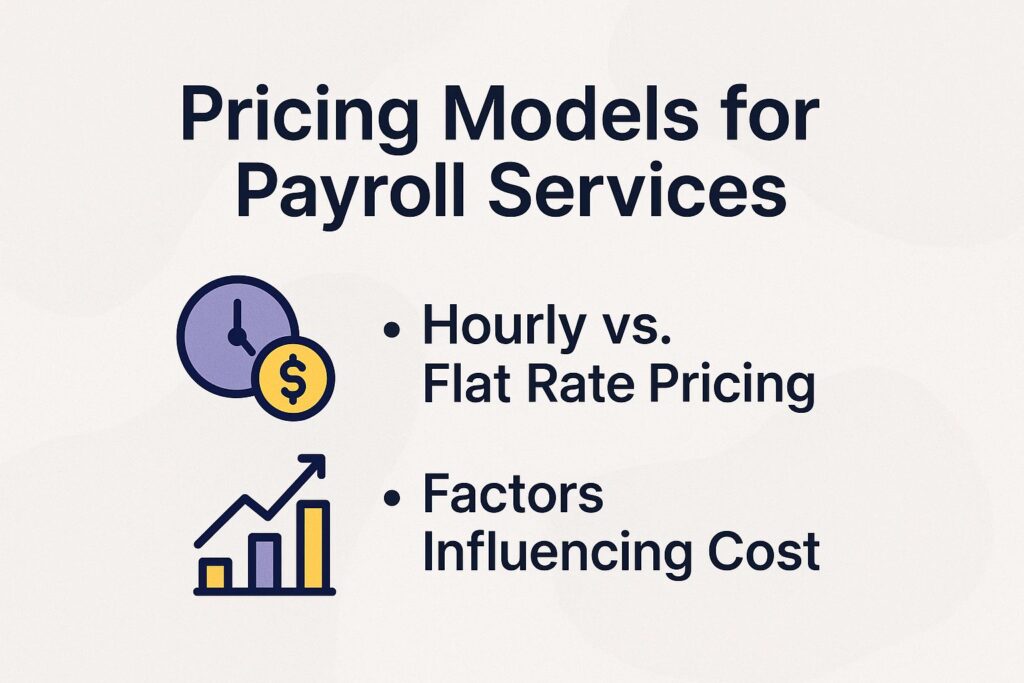
Knowing how payroll services charge, including software pricing and subscription models, can help construction companies plan their budgets effectively.
Prices usually fall between $25 and $200 monthly, based on the needed features.
Hourly vs. Flat Rate Pricing
Hourly rates can differ a lot, beginning at $10 for simple services and reaching $50 for complete payroll help, while flat rate services might cost $200 per month.
When deciding between these models, consider your specific needs. For infrequent, on-demand services, hourly pricing is often more economical, allowing you to pay solely for the hours worked.
Conversely, if you require ongoing or regular support, flat rates can offer predictability in budgeting. For example, a small business needing weekly payroll might find a flat rate more sustainable than calculating hourly for each payroll cycle.
Many providers offer trial periods for their flat rate services, enabling businesses to gauge their value before committing.
Factors Influencing Cost
Things like how many employees you have and the type of service you need can change payroll service costs by as much as 30%. It’s important to consider these needs before choosing a service.
To reduce payroll service costs and achieve cost-effective solutions, follow these practical suggestions:
- First, assess your actual payroll frequency-monthly processing may be cheaper than bi-weekly for smaller businesses.
- Next, review service features; opting for a basic package without advanced tax tools can save money if your company can handle taxes internally.
- Use technology; with software like QuickBooks Payroll, you can depend less on external services, reduce costs, and still maintain accuracy.
Choosing the Right Payroll Service Provider
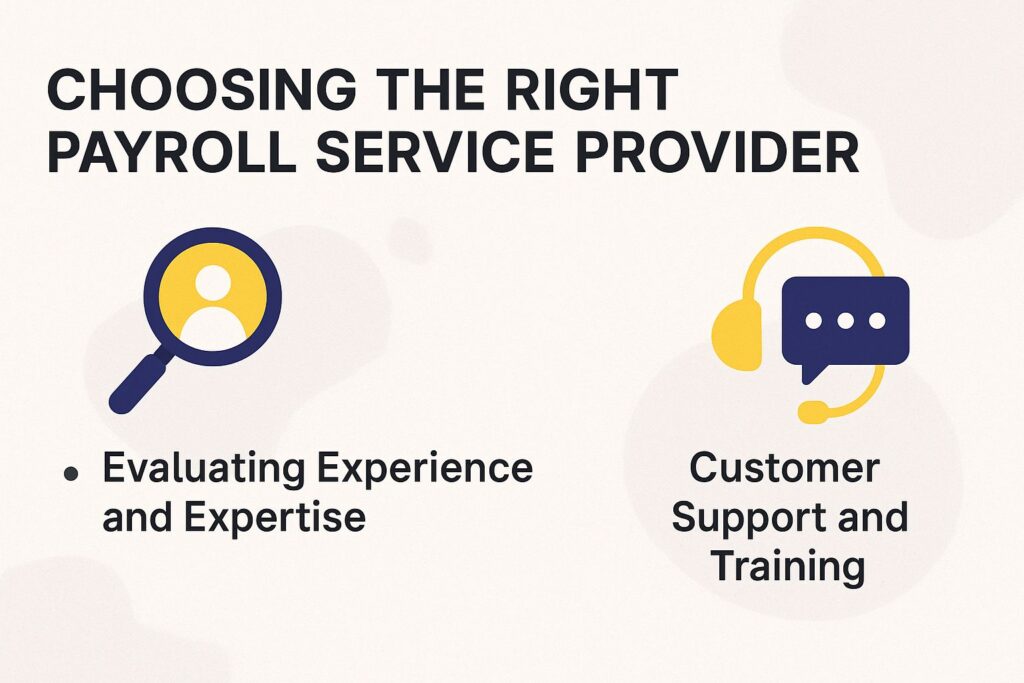
Choosing a good payroll service can improve how you run your business. The top providers give full help and fair pricing. For small businesses, one resourceful option is to explore payroll outsourcing services available from as low as $19/month.
Evaluating Experience and Expertise
Companies with over five years of experience typically provide better support with compliance and knowledge, lowering risk for construction companies.
When picking payroll service providers, look for those with positive client reviews and experience in your field, as these qualities can build trust.
For example, companies that frequently collaborate with construction businesses often know the specific tax rules and labor laws, which makes them extremely helpful partners.
Using comparison tools like G2 or Capterra can make your search easier by showing user ratings and reviews. Looking at case studies gives specific examples of how a provider has helped similar businesses cut down on payroll mistakes and make processes smoother.
Focus on providers that offer solutions you can adjust to fit your unique requirements.
Customer Support and Training
Good customer support can cut down resolution times by 40%. Training materials, including user training, help users become better, leading to fewer mistakes in handling payroll.
Providers like Gusto, ADP, and Paychex offer exceptional support features. Gusto provides personal assistance from a payroll expert, and ADP offers a thorough help center along with 24/7 phone support.
Paychex stands out with its online training webinars, ensuring users stay informed about new features. These support resources simplify payroll management and help employees use the system confidently, leading to more accurate payroll processing and fewer compliance issues.